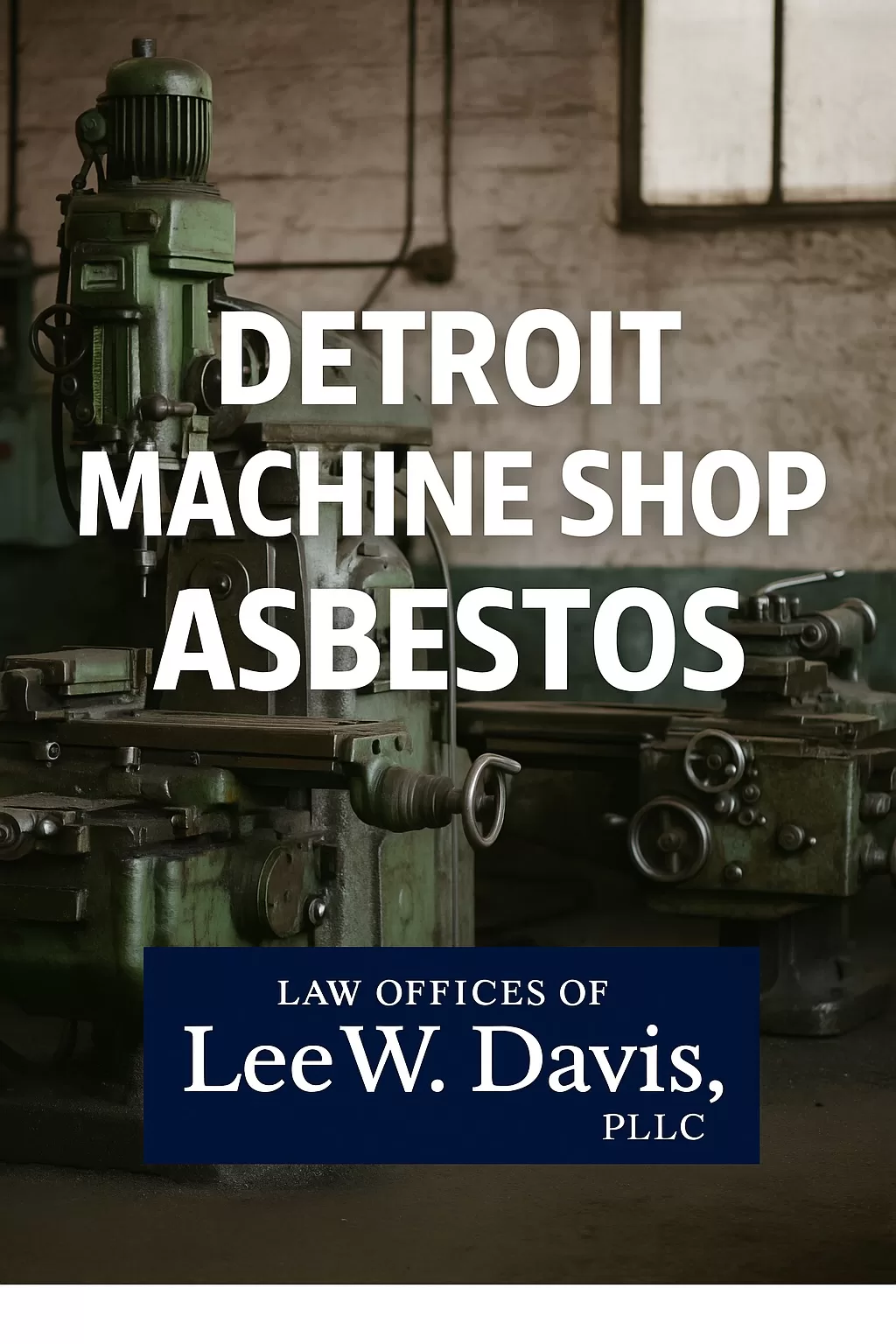Detroit Machine Shop Asbestos exposure affected thousands of skilled tradesmen during Michigan’s industrial boom. From Ford’s Rouge Complex to GM’s Detroit Gear & Axle, machinists, millwrights, and tool-and-die makers were surrounded by asbestos dust on a daily basis. These fine fibers—once thought to be harmless—caused long-term health effects such as mesothelioma and lung cancer.
For decades, Detroit’s machine shops formed the backbone of America’s automotive industry. The heat, friction, and precision involved in manufacturing engine components and tools demanded asbestos-containing materials for insulation, sealing, and safety. What no one realized at the time was that the same material protecting machinery was silently harming the people who operated it.
Where Asbestos Was Found in Machine Shops
Asbestos appeared in almost every corner of Michigan’s industrial worksites:
- Gaskets and seals used in pumps, compressors, and engines
- Pipe and boiler insulation surrounding shop heating systems
- Brake linings and clutches on mechanical lathes and vehicles under repair
- Protective clothing, including heat-resistant gloves and aprons
- Cement and joint compounds used to patch furnace and equipment housings
When machinists cut, ground, or drilled into these parts, asbestos fibers became airborne, invisible, and deadly. Because ventilation was often poor, fibers settled on work surfaces and stayed in the air long after the machines stopped running.
Occupations Most at Risk in Detroit Machine Shops
Machine shops served every level of the automotive and steel supply chain. Workers most likely to encounter asbestos included:
- Machinists and tool-and-die makers
- Millwrights, mechanics, and maintenance personnel
- Lathe operators and precision grinders
- Boiler technicians and pump repair specialists
- Welders and metal fabricators
Many of these workers also performed maintenance on industrial furnaces and equipment that used asbestos insulation, creating even higher exposure risks.
Detroit’s Historic Industrial Exposure
Detroit’s auto corridor was once home to hundreds of machine and tool shops that supported the Ford Rouge Complex, Chrysler Jefferson Plant, and General Motors facilities in Hamtramck and Warren.
👉 Search Asbestos job Sites in Michigan
These operations required constant equipment overhauls.
Whenever parts were replaced or repaired, asbestos-filled components were sanded, scraped, or drilled apart.
Over time, the buildup of asbestos dust inside small workshops created chronic exposure conditions.
Even after asbestos warnings emerged in the 1970s, many suppliers continued to ship asbestos-laden gaskets, pipe coatings, and friction products well into the 1980s.
Michigan machinists unknowingly worked with toxic materials long after other industries began phasing them out.
Health Risks and Diseases Linked to Exposure
Asbestos exposure is a proven cause of:
- Mesothelioma, a cancer of the lung or abdominal lining
- Lung cancer, often decades after exposure
- Asbestosis, a chronic lung-scarring disease
- Pleural thickening and respiratory impairment
Symptoms—persistent cough, shortness of breath, or chest pain—may not appear until 20 to 50 years after the initial exposure.
Many Michigan workers are only now discovering health problems linked to their machine-shop employment from decades earlier.
How Michigan Workers Can File Asbestos Claims
If you worked in a Detroit machine shop and later developed an asbestos-related illness, you may be entitled to compensation through:
- Asbestos bankruptcy trust funds
- Lawsuits against manufacturers or distributors
- Workers’ compensation or third-party claims
A qualified attorney can identify which asbestos products were present in your workplace and pursue claims against the companies that made or sold them—even if the shop itself closed years ago.
Evidence That Supports a Detroit Asbestos Case
To succeed, a claim often relies on:
- Work history documentation from union or employer records
- Coworker testimony describing shop conditions
- Proof of product use (gaskets, insulation, etc.)
- Medical evidence linking your diagnosis to exposure
Many Detroit-area machinists qualify for compensation based on their trade alone because national asbestos-trust criteria specifically recognize machining, tool-and-die, and maintenance occupations.
Why Experience Matters in Michigan Asbestos Cases
Attorney Lee W. Davis has decades of experience handling industrial asbestos claims throughout the Midwest.
Between 1996 and 1999, he managed more than 3,200 Saginaw GM Foundry asbestos cases, helping Michigan families recover compensation from major manufacturers.
That knowledge—built from years inside foundries, power plants, and machining environments—means his firm knows exactly how to connect your work history to the correct asbestos products and responsible companies.
Legal Rights for Families
Families of deceased workers may still pursue wrongful-death claims under Michigan law.
These cases can provide compensation for medical costs, loss of income, and emotional suffering.
Even if decades have passed, many trust funds remain open to new claims.
Act Quickly — Michigan Filing Deadlines
Michigan law imposes strict time limits on asbestos and mesothelioma claims:
- 3 years from diagnosis or death for personal-injury and wrongful-death actions.
- Certain trust-fund deadlines may differ, but timely filing is essential.
If you suspect your disease is related to asbestos exposure, don’t wait.
Filing early ensures access to available funds and preserves key evidence.
Free Legal Consultation for Detroit Machine Shop Workers
If you worked in a Detroit-area machine or tool-and-die shop and later developed mesothelioma, lung cancer, or another asbestos-related disease, you deserve answers and support.
Call (412) 781-0525 or visit leewdavis.com for a free consultation with the Law Offices of Lee W. Davis, Esquire, PLLC.
No fees unless recovery is made.
FAQs About Detroit Machine Shop Asbestos
1️⃣ Which Detroit machine shops used asbestos materials?
Many auto-supply shops near Ford Rouge, Jefferson, and Hamtramck used asbestos gaskets, brake linings, and insulation until the late 1980s.
2️⃣ Can former machinists still qualify for compensation?
Yes. Even if exposure occurred decades ago, many asbestos-trust funds still accept claims from machinists and maintenance workers.
3️⃣ What if the company went out of business?
Claims target product manufacturers, not your employer, so you may still recover through national asbestos-trust programs.

